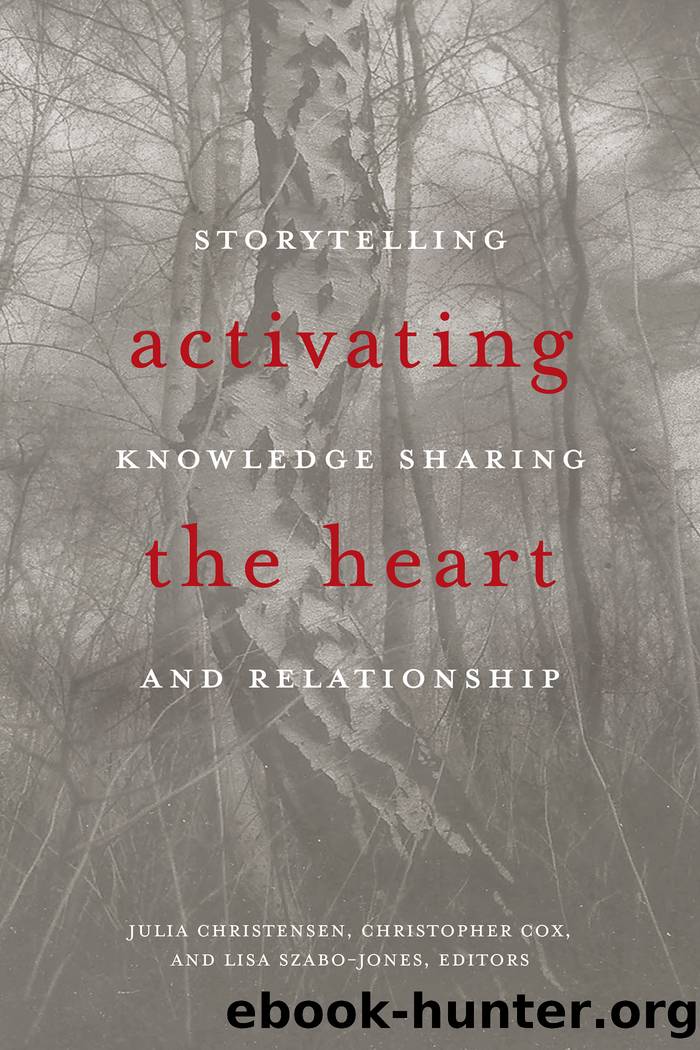Activating the Heart by Julia Christensen

Author:Julia Christensen
Language: eng
Format: epub
Publisher: Wilfrid Laurier University Press
Published: 2018-02-15T00:00:00+00:00
CHAPTER FIVE
âGrandson, / This is meatâ: Hunting Metonymy in François Mandevilleâs This Is What They Say
Jasmine Spencer
1. Introduction
François Mandeville (1878â1952) was a Métis-Chipewyan trapper, fur trader, interpreter, and storyteller who lived in a region of northern Canada that is defined by Great Slave Lake to the north and Lake Athabasca to the south, connected by a system of waterways that leads, eventually, to the Arctic Sea (Bringhurst 2009, 7). Mandeville worked for the Hudsonâs Bay Company (HBC) until he became ill; throughout his convalescence, he built boats and trapped for himself (Scollon 2009, 228). Eventually, he returned to the HBC, retired, and passed on at the age of seventy-four in Fort Chipewyan. His was the life of a true translator; he was, in addition to a navigator of a landscape riddled with muskeg, lakes, rivers, and boreal forest, accomplished in oral and written communications and a polyglot, and thus he was also a navigator of multiple cultures and world views (229). In 1928, he narrated twenty stories to a young Chinese linguist, Li Fang-Kuei, who was seeking to study Dene languages. Five of these stories were elicited by Li (Scollon 2009, 238); they are highly pragmatic, describing how Indigenous peoples educate their youth, how to fish, how to make a canoe, how to tan a moosehide, and how to hunt beaver. But the other fifteen stories were chosen and arranged in the order of their delivery by Mandeville himself (238). Most importantly for the place where I would like to begin my analysis, Mandeville collaborated with Li on the transcriptions of those stories, editing many of the discourse markers and contributing to an exhaustive collection of paradigm slips (236â37), a textual trace of his attention to the structural qualities of the narratives. Mandeville was as fully cognisant of the way text is put to page as he was of how to live off the land and of how to negotiate cultural difference: in other words, he was aware of and adept at signification and interpretation in multiple modesâoral, written, environmental, and ontological, in the figures of animals and of their tracks and trails.1
Mandeville was also sensitive to literary style. He served language in both legal court contexts and liturgical church contexts (Scollon 2009, 229, 258). Indeed, Ronald Scollon, who translated Mandevilleâs stories from Dene (Chipewyan) to English twice, once in 1976 and again in 2009, writes with his research partner Suzanne Scollon that âwhen Li asked Mandeville for stories, Mandeville took it as an opportunity to produce his âhighest liturgical styleâ ⦠developing a âhighâ or, if you prefer, literary languageâ (2009, 257), while Robert Bringhurst suggests, in his foreword to Scollonâs 2009 translation, that
[Mandevilleâs] tales of hunters and animals are Athabaskan [Dene] metaphysics incarnate. He achieved, with the Chipewyan language, the kind of symbiotic relationship that literature demands. He knew not just the meanings of the words, the permutations of the verb, and the syntax of the sentence. He had learned the motivic form of those much larger units of Chipewyan thought that we call stories.
Download
This site does not store any files on its server. We only index and link to content provided by other sites. Please contact the content providers to delete copyright contents if any and email us, we'll remove relevant links or contents immediately.
The Power of Myth by Joseph Campbell & Bill Moyers(1068)
A Social History of the Media by Peter Burke & Peter Burke(988)
Half Moon Bay by Jonathan Kellerman & Jesse Kellerman(987)
Inseparable by Emma Donoghue(983)
The Nets of Modernism: Henry James, Virginia Woolf, James Joyce, and Sigmund Freud by Maud Ellmann(913)
The Spike by Mark Humphries;(812)
The Complete Correspondence 1928-1940 by Theodor W. Adorno & Walter Benjamin(789)
A Theory of Narrative Drawing by Simon Grennan(783)
Culture by Terry Eagleton(776)
Ideology by Eagleton Terry;(743)
World Philology by(719)
Farnsworth's Classical English Rhetoric by Ward Farnsworth(715)
Game of Thrones and Philosophy by William Irwin(712)
Bodies from the Library 3 by Tony Medawar(709)
High Albania by M. Edith Durham(705)
Adam Smith by Jonathan Conlin(695)
A Reader’s Companion to J. D. Salinger’s The Catcher in the Rye by Peter Beidler(689)
Monkey King by Wu Cheng'en(654)
Comic Genius: Portraits of Funny People by(652)
